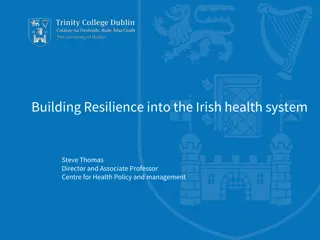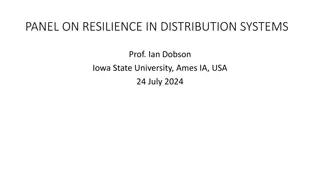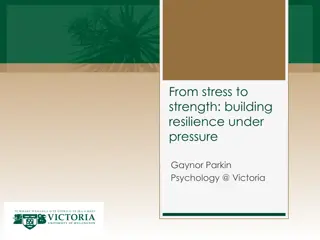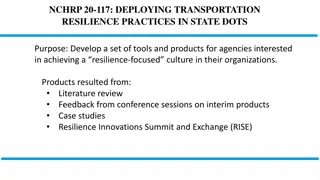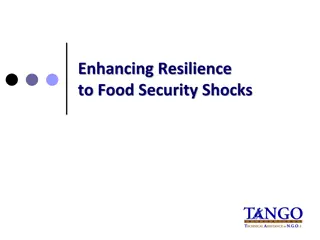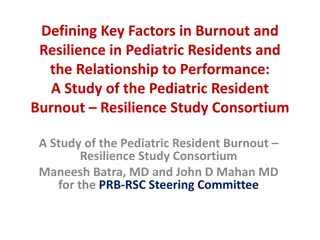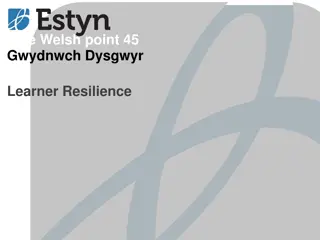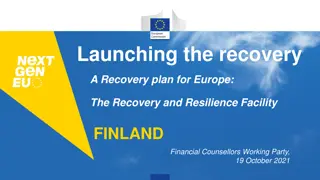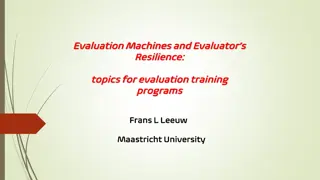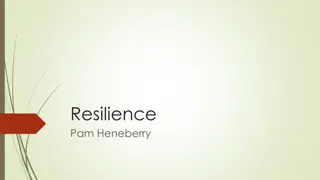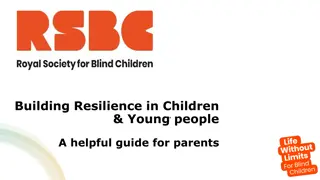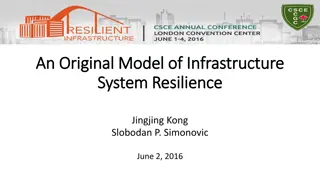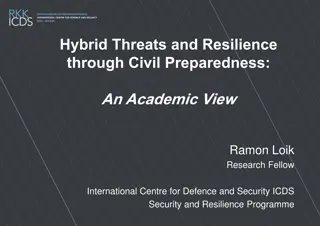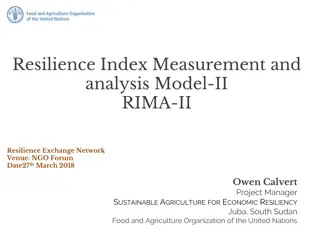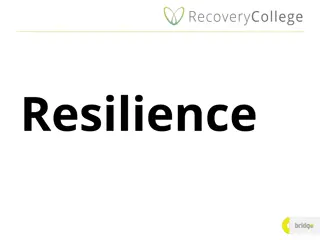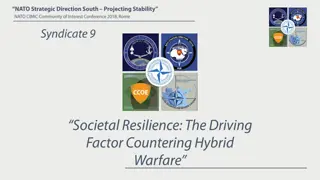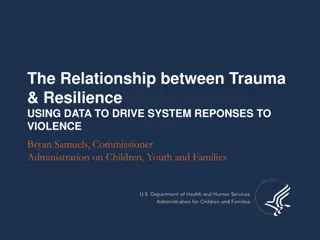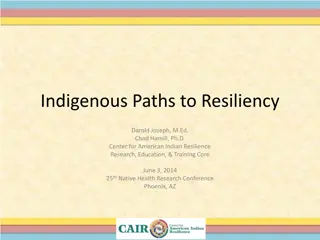Developing Resilience Through Physical Education: Strategies and Insights by Damian Hodge
Damian Hodge, an experienced Sport Psychology Manager, shares his expertise in developing resilience through PE sessions for children. He emphasizes the importance of resilience, provides insights on children's experiences, and highlights the significance of fostering resilience in overcoming challenges. Through interactive sessions, he delves into practical ways to enhance resilience in young individuals, recognizing its pivotal role in their emotional well-being and success.
Download Presentation

Please find below an Image/Link to download the presentation.
The content on the website is provided AS IS for your information and personal use only. It may not be sold, licensed, or shared on other websites without obtaining consent from the author. Download presentation by click this link. If you encounter any issues during the download, it is possible that the publisher has removed the file from their server.
E N D
Presentation Transcript
DEVELOPING RESILIENCE THROUGH PE Damian Hodge MSc in Applied Sport Psychology dh@bwb03.com
ABOUT ME I am the Sport Psychology Manager at Bristol City F.C. Academy where one of my focuses is on developing resilience in players from U9-U23s. I have designed and delivered resilience sessions across primary schools in B&NES in partnership with the schools sport partnership and BWB03. I have 20 years coaching experience delivering PE lessons and after school sessions, clubs and holiday courses. I am a F.A. and UEFA qualified coach with 15 years experience coaching at Bristol City F.C.
SESSION OUTLINE 1) What is resilience 2) Your experiences 3) Importance of resilience for children 4) Brief overview of resilience research 5) Developing resilience through PE 6) Session structure and session ideas Interactional questions and discussion to make it relevant to your practice
WHAT IS RESILIENCE? 1) Robust resilience - Maintain functioning when under pressure 2) Rebound resilience Bounce back from minor/temporary disruptions to well being Perceived sense of threat physical or mental
WHAT ARE YOUR EXPERIENCES OF CHILDRENS RESILIENCE LEVELS IN PE LESSONS & SCHOOL? Why might a child lack resilience? Perceived lack of competence Lack of self regulation / emotional control Lack of social confidence Negative past experiences Lack of interest in P.E / sport Lack of social support Additional physical /learning needs
WHY ITS IMPORTANT TO DEVELOP CHILDREN S RESILIENCE LEVELS The children came out with a message that would help them with other activities. They learned the importance of challenging themselves and taking managed risks; they enjoyed the session thoroughly. Y6 Teacher, Saltford Primary. Through my work I have observed that more children seem to demonstrate a lack of resilience. Many colleagues have also identified this as a growing issue in children and agree that more action is needed to help children develop this important life skill. This lack of resilience can be most evident in children s response to failure or when attempting something new or challenging. Resilience is necessary for children to have a positive approach to new tasks, overcome setbacks and maintain their effort. Resilience is necessary during difficulty and in protecting their own emotional well being.
RESEARCH KEY POINTS Resilience may be fostered by controlled exposure to manageable challenges or stresses, rather than through their avoidance. Benefits may depend on mental features; such as planning, self- reflection and personal agency. Success in areas outside the family (such as schools) may foster these features. Individual differences in response to challenges are influenced by genetic factors. Resilience is not a fixed trait and can be developed.
RESEARCH RESILIENCE Challenge mind-set Personal qualities Facilitative environment Fletcher & Sarkar 2016
PERSONAL QUALITIES AND INFLUENCING FACTORS FOR DEVELOPING RESILIENCE Desirable outcomes Commitment, Confidence, Concentration Psychological Skills Self-talk, Mental planning, Emotional regulation Personality Characteristics Optimistic, Goal orientation Fletcher & Sarkar 2016
HOW WE CAN USE PE TO DEVELOP CHILDREN S RESILIENCE LEVELS Focus should be on developing children s psychological resources rather than concentrating on doing away with risk. Reinforce the fact that feeling challenged is a good place to be cognitive change. Use experiential learning and reflection to increase self awareness Redefine success
Panic Zone Challenge Learning zone Comfort Zone Me
HOW WE CAN USE PE TO DEVELOP CHILDREN S RESILIENCE LEVELS PE lessons can be an excellent platform for promoting resilience. PE offers opportunities for children to: Try something new Attempt something hard and challenge their current ability Do something they don t like/don t feel comfortable doing
RESILIENCE PROMOTERS P.E lessons should include: Autonomy to chose challenging activities. Self-referenced improvement the opportunity to demonstrate competence. Opportunity to be challenged to feel uncomfortable and respond positively.
STRUCTURE AND OUTCOMES OF PE LESSONS Make the learning outcome the response to challenge/failure rather than achieving physical skills/tasks.
STRUCTURE AND OUTCOMES OF PE LESSONS - 1. Set the scene - 2. Provide the challenge - 3. Support the children in their reactions - 4. Review their response
STRUCTURE AND OUTCOMES OF PE LESSONS Response to failure Set the Scene Learning Objective Provide the challenge Individual/group challenges Netball Skills Support them through their reactions Target thoughts and feelings Helpful vs unhelpful Decisions to challenge and persist Review their response Increase self awareness
1. SET THE SCENE Today we are going to be doing At some point you may do something you have not done before, something you find difficult or something you don t like or something you find easy. - You may feel uncomfortable - You might not feel like trying If this happens I wonder how you will respond? Will you chose to challenge yourself, will you keep trying even though you aren t able to do it YET! Success will not be whether you can do the skill but whether you can chose to challenge yourself and keep trying.
2. PROVIDE THE CHALLENGE Set up 3-4 skill challenges (i.e. hit ups) that children can practice each week and try and improve THEIR score. - Opportunity for objective feedback on improvement - Increase perceived competence - Increase confidence (self-efficacy) - Opportunity to persist and persevere
PROVIDE THE CHALLENGE Catching challenge how many catches can you make with your partner? Try and make 20 catches, using one of these options: Option A Two hands on two feet Option B One hand on two feet Option C Two hands on one foot Option D One hand on one foot Ask children if they were in the Green (comfort), Amber (challenge) or Red (panic) zones? Next attempt - Who can improve their score the most?
3. SUPPORT CHILDREN THROUGH THEIR REACTIONS Addressing thoughts, feelings and behaviours Emotional regulation means being able to think constructively about how to cope with feelings. We want children to have their feelings, but not be overwhelmed by them; to feel discouraged but not give up, to feel anxious but not stay home, and to be excited but not get so carried away in their enthusiasm that they use poor judgment in making decisions .
3. SUPPORT CHILDREN THROUGH THEIR REACTIONS Children who excel may not challenge themselves as they have a reputation to uphold. Children who do not excel may not challenge themselves as it reinforces their low perception of competence. Autonomy competence relatedness (Deci & Ryan)
Emotional regulation Control your thoughts & words and create a positive cycle Thoughts Emotions Words Performance
4. REVIEW THE CHILDRENS RESPONSES Encourage self-reflection Who challenged themselves? How did they respond? Who persisted? How did they feel when it was difficult ? How did they feel about themselves after they persisted? Try and identify and reinforce times when children have demonstrated resilience.





